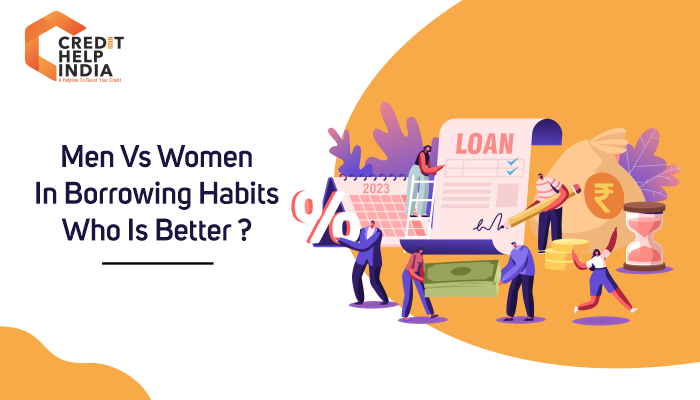Exploring the Differences in Borrowing Habits Between Men and Women

Introduction
When it comes to borrowing habits, it's easy to fall into the trap of making broad generalisations about men and women. However, the truth is that both genders have their own unique approaches to borrowing and credit, and there is no one-size-fits-all answer to the question of who is better at managing their debts. In this article, we'll take a deeper look at the differences between men and women in terms of borrowing habits, and explore some of the key factors that contribute to these differences.
Access To Credit
One of the most significant differences between men and women in terms of borrowing habits is access to credit. While access to credit has improved significantly in recent years, women still face a number of challenges when it comes to getting approved for loans and other forms of credit. According to a report from the Times of India, women are less likely than men to be approved for loans. This is partly due to the fact that women tend to have lower credit scores than men, which can make it more difficult for them to get approved for credit.
Despite these challenges, women have been making significant progress in terms of increasing their access to credit. For example, the number of women-owned businesses has increased significantly in recent years, and more women are now taking out loans to finance their businesses. This trend is likely to continue in the coming years as more and more women become entrepreneurs and seek out funding to grow their businesses.
CIBIL data also suggests that the share of women borrowers has increased to 29 per cent in 2021, which is up from 25 per cent as was recorded in 2016.
Lower Default Rates
Men and women have different borrowing habits when it comes to home loans. While both genders can be responsible borrowers, research has shown that women tend to have lower default rates on home loans compared to men.
- One possible reason for this is that women tend to be more risk-averse when it comes to financial decisions. They may be more likely to do their research and consider all of their options before committing to a loan. This careful approach can help them avoid taking on more debt than they can handle.
- Another reason women may have lower default rates is that they tend to have lower debt-to-income ratios. This means that they have less debt relative to their income, which can make it easier for them to make their loan payments.
- Women also tend to have better credit scores than men, which can make it easier for them to secure a home loan with a lower interest rate. This can also make it easier for them to make their monthly payments and avoid defaulting on their loans.
A study from December 2019 found that 29% of home loans in India are taken out by women. However, the percentage of women borrowers for personal loans is only 15%.
The Home Mortgage Disclosure Act (HMDA) shows a breakdown of home loans taken by 6 different groups.
Self-Monitoring
One key factor that may influence how well someone is able to manage their debts is their level of self-monitoring.
Self-monitoring refers to the ability to pay attention to one's own behaviour and make adjustments as needed. It's an important skill to have when it comes to managing debt, as it can help individuals stay on top of their finances and avoid falling behind on their payments.
Research has shown that women tend to have better self-monitoring skills than men. This may be because women are more attuned to their own emotions and behaviour, and are therefore more likely to pay attention to warning signs that they are getting in over their heads with debt.
According to a study by TransUnion CIBIL, the number of women who self-monitor their credit rise by 62% between 2018 and 2019. This is notable because it is twice the rate of men who self-monitor their credit.
Conservative Spending
In general, women tend to be more conservative in their spending habits than men. This means that they are less likely to take on large amounts of debt in order to finance expensive purchases or investments. Instead, women are more likely to save up for major expenses and pay for them in cash or with a credit card that they can pay off in full each month. This conservative approach to borrowing and spending can help women avoid getting into financial trouble and can help them build up a strong credit history.
Growth Drivers
While both men and women can be successful borrowers and investors, there are certain factors that tend to drive growth in women's borrowing habits. One of the key drivers of growth for women is education. According to a report from the Small Business Administration, women who have completed a college education are more likely to start their own businesses and take out loans to finance their ventures. Additionally, women who have strong networks of supportive friends and family members are more likely to have access to the financial resources and advice they need to succeed.
New-Age Investing
In recent years, there has been a shift towards more innovative and technology-driven forms of investing. This includes the rise of online platforms that allow people to easily invest in a variety of assets, such as stocks, real estate, and even cryptocurrency. While men have traditionally been more active in the stock market and other forms of traditional investing, women are increasingly getting in on the action as well. According to a report from CNBC, women are more likely to invest in alternative assets such as cryptocurrency, which can offer higher returns but also come with more risk.
Conclusion
In conclusion, both men and women have their own unique approaches to borrowing and credit. While women may face some challenges in terms of accessing credit, they tend to have lower default rates on home loans and are generally more financially literate and conservative in their spending habits. These traits can help them avoid financial pitfalls and make better borrowing decisions. With the rise of new-age investing and the increasing number of women-owned businesses, we will continue to see growth in women's borrowing habits in the coming years.


